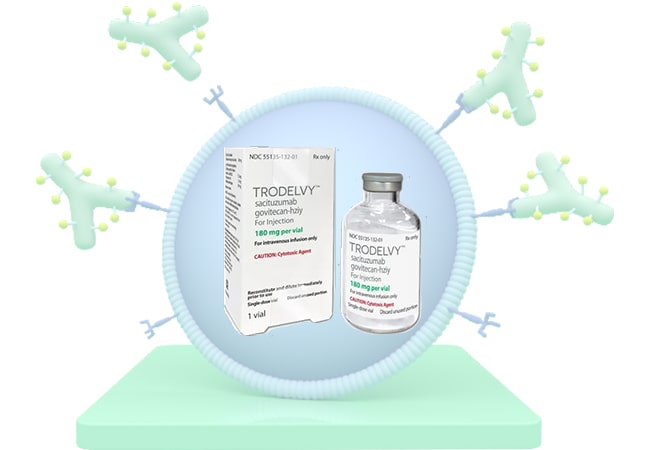Trodelvy, known by its generic name, sacituzumab govitecan, has emerged as a powerful treatment option for certain cancers, especially metastatic triple-negative breast cancer (mTNBC), hormone receptor (HR)-positive, HER2-negative breast cancer, and metastatic urothelial cancer. This medicine, supplied as a 180 mg lyophilized powder for injection, is reconstituted for patient administration. But how does Trodelvy work, and what makes it unique in the field of cancer treatment?
Trodelvy is an advanced antibody-drug conjugate (ADC), designed specifically to target and kill cancer cells. Its innovative mechanism combines a targeted monoclonal antibody with a cancer-killing drug, providing a more precise and effective approach than traditional chemotherapy. Let’s understand how Trodelvy works against cancer.
Trodelvy’s Mechanism of Action:
Trodelvy’s Smart Targeting- Finding Cancer Cells with Precision: This therapeutic drug works by targeting a specific protein called Trop-2, which is found in high levels on many cancer cells, especially in aggressive cancers like triple-negative breast cancer. Trop-2 acts like a “marker” that helps Trodelvy hone in on cancer cells with remarkable accuracy.
How does it do this? Trodelvy contains a monoclonal antibody — think of it as a guided missile that seeks out and binds to Trop-2 on the cancer cell surface. Once it attaches to these cells, Trodelvy starts its second phase: delivering its powerful drug payload directly to the cancer cell.
Payload Delivery- Unleashing Cancer-Killing Power Inside the Cell: Once Trodelvy latches onto the Trop-2 protein on a cancer cell, it’s taken inside the cell, like a Trojan horse. Inside, Trodelvy releases its hidden weapon: govitecan, a drug designed to kill cancer cells by disrupting their DNA.
Govitecan works by blocking an enzyme called topoisomerase I, which cancer cells need to repair their DNA and multiply. Without this enzyme, DNA damage builds up, causing the cancer cell to break down and die in a process called apoptosis, or programmed cell death.
Trodelvy’s Advantages Over Chemotherapy:
Trodelvy offers major benefits because it specifically targets cancer cells, not healthy cells. Traditional chemotherapy, by contrast, can’t tell the difference between cancerous and healthy cells, often causing severe side effects. Here’s what makes Trodelvy different:
- Fewer Side Effects: Targeted delivery to cancer cells reduces the likelihood of damage to normal cells, which means fewer side effects like nausea, fatigue, and hair loss.
- Higher Concentration in Cancer Cells: Because it’s taken directly into the cancer cell, Trodelvy’s cancer-killing drug, govitecan, can reach high concentrations right where it’s needed, increasing its effectiveness.
Clinical Success: Trodelvy’s Proven Impact
Clinical trials have shown that Trodelvy isn’t just a promising idea — it delivers real results for patients who have run out of other options. Studies on patients with metastatic triple-negative breast cancer and metastatic urothelial cancer have demonstrated that Trodelvy can improve outcomes where other treatments have failed.
For example, the ASCENT trial reported:
- Progression-Free Survival: Trodelvy achieved a median of 5.6 months, compared to 1.7 months with standard treatments.
- Overall Survival: Patients receiving Trodelvy had a median survival time of 12.1 months, while those on other treatments saw only 6.7 months.
These numbers mean a lot to patients facing life-limiting conditions; Trodelvy is extending lives and offering a better quality of life by reducing the need for harsh traditional chemotherapy.
Expanding Potential: Future Research on Trodelvy
The success of Trodelvy has spurred ongoing research to explore even broader applications. Scientists are investigating how Trodelvy might work alongside other therapies, such as immunotherapy, to create an even stronger cancer-fighting arsenal. Because Trop-2 is present in many other types of cancer, there is potential for Trodelvy to treat a wider range of aggressive tumors.
What types of cancer does Trodelvy treat?
Trodelvy is approved for metastatic triple-negative breast cancer (mTNBC), hormone receptor (HR)-positive, HER2-negative breast cancer, and metastatic urothelial cancer, particularly for patients who have not responded to previous therapies.
How does Trodelvy work?
Trodelvy targets cancer cells with Trop-2, a protein found in many aggressive cancer cells. By binding to Trop-2, Trodelvy releases a powerful anticancer drug, govitecan, directly inside the cell, minimizing harm to normal cells.
Why is Trodelvy different from standard chemotherapy?
Unlike chemotherapy, which affects both cancerous and healthy cells, Trodelvy targets only the cancer cells, offering a more focused treatment with fewer side effects.
What are the side effects of Trodelvy?
Side effects can include nausea, fatigue, hair loss, and low blood counts. However, side effects are generally less severe compared to traditional chemotherapy. It’s important to consult your healthcare provider to manage these effects properly.
Can Trodelvy be combined with other cancer treatments?
Yes, research is ongoing to explore Trodelvy’s effectiveness when combined with other treatments, such as immunotherapy, to potentially enhance its cancer-fighting abilities.
Where can I buy Trodelvy in India?
Buy Trodelvy in several major cities across India. It’s essential to contact authorized/trusted suppliers or healthcare providers to ensure you’re getting genuine and legally obtained medication. Indian Pharma Network (IPN) and similar organizations assist with Trodelvy supplies in cities like New Delhi, Mumbai, Bangalore, Hyderabad, Chennai, Kolkata, Pune, Ahmedabad, Lucknow, Jaipur, Noida, and Chandigarh.
How can I send my inquiry to buy Trodelvy in India?
To buy Trodelvy, send your inquiries directly to Indian Pharma Network (IPN) via Call/WhatsApp: +91 9310090915 or similar authorized suppliers. You can reach out for assistance in Lucknow, Delhi, Noida, Mumbai, Hyderabad, Bangalore, Kolkata, Chennai, Pune, Ahmedabad, Jaipur, and Chandigarh.
Can I buy Trodelvy from outside India and import it?
Importing medications independently can be complex and may require special permissions. It’s often easier and more reliable to work with Indian suppliers like Indian Pharma Network (IPN) who can facilitate the process legally and securely.
Can I get Trodelvy delivered to my city?
Yes, as a trusted supplier, Indian Pharma Network can arrange delivery to various cities across India. You can inquire about delivery options for cities like Delhi, Mumbai, Hyderabad, Bangalore, Kolkata, Chennai, Ahmedabad, Pune, Jaipur, Lucknow, Noida, and Chandigarh.






